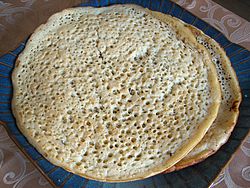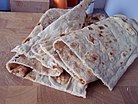Lahoh: Difference between revisions
Undid revision 875456546 by יניב הורון (talk) |
יניב הורון (talk | contribs) Undid revision 875463543 by 79.182.28.177 (talk) |
||
| Line 5: | Line 5: | ||
| caption = |
| caption = |
||
| alternate_name = Laxoox, Canjeero, Canjeelo |
| alternate_name = Laxoox, Canjeero, Canjeelo |
||
| country = [[Somalia]], [[Djibouti]], [[Yemen]] |
| country = [[Somalia]], [[Djibouti]], [[Yemen]], [[Israel]]. |
||
| region = |
| region = |
||
| creator = |
| creator = |
||
| Line 17: | Line 17: | ||
}} |
}} |
||
'''Lahoh''', also '''Luḥūḥ''' {{Lang-so|Laxoox}}) ({{lang-ar|لحوح}}, {{lang-he|לחוח}}, is a spongy, [[pancake]]-like bread originating in [[Somalia]], [[Djibouti]], and [[Yemen]].<ref>[http://www.yobserver.com/news-varieties/printer-1002499.html Little Business Women] {{webarchive|url=https://archive.is/20110928085026/http://www.yobserver.com/news-varieties/printer-1002499.html |date=2011-09-28 }}</ref><ref name="Abdullahi">Mohamed Diriye Abdullahi, ''Culture and Customs of Somalia'', (Greenwood Press: 2001), p. 113.</ref> |
'''Lahoh''', also '''Luḥūḥ''' {{Lang-so|Laxoox}}) ({{lang-ar|لحوح}}, {{lang-he|לחוח}}, is a spongy, [[pancake]]-like bread originating in [[Somalia]], [[Djibouti]], and [[Yemen]].<ref>[http://www.yobserver.com/news-varieties/printer-1002499.html Little Business Women] {{webarchive|url=https://archive.is/20110928085026/http://www.yobserver.com/news-varieties/printer-1002499.html |date=2011-09-28 }}</ref><ref name="Abdullahi">Mohamed Diriye Abdullahi, ''Culture and Customs of Somalia'', (Greenwood Press: 2001), p. 113.</ref> It is also popular in [[Israel]], where it was introduced by [[Yemenite Jews]] who immigrated there.<ref>[http://food.lizsteinberg.com/2010/01/27/hatikva-market/ Hatikva market — the other side of Tel Aviv] {{webarchive|url=https://web.archive.org/web/20150427220227/http://food.lizsteinberg.com/2010/01/27/hatikva-market/ |date=2015-04-27 }}</ref> In Yemen, it was often sold on the street by peddlers.<ref>[http://www.yobserver.com/news-varieties/10012048.html Dholas and other straw hats come into season] {{webarchive|url=https://archive.is/20120308164202/http://www.yobserver.com/news-varieties/10012048.html |date=2012-03-08 }}</ref> |
||
==Preparation== |
==Preparation== |
||
Revision as of 19:44, 26 December 2018
 | |
| Alternative names | Laxoox, Canjeero, Canjeelo |
|---|---|
| Type | Flatbread |
| Place of origin | Somalia, Djibouti, Yemen, Israel. |
| Main ingredients | Plain flour, self-raising flour, water, yeast, salt |
Lahoh, also Luḥūḥ Somali: Laxoox) (Arabic: لحوح, Hebrew: לחוח, is a spongy, pancake-like bread originating in Somalia, Djibouti, and Yemen.[1][2] It is also popular in Israel, where it was introduced by Yemenite Jews who immigrated there.[3] In Yemen, it was often sold on the street by peddlers.[4]
Preparation
Lahoh is prepared from a dough of plain flour, self-raising flour, warm water, yeast, and a pinch of salt. The mixture is beaten by hand until soft and creamy .[5] Sorghum is the preferred flour for making lahoh. There is a sweet-tasting variety of the dish, as well as another variety that is made with eggs.[2]
Lahoh is traditionally baked on a metallic circular stove called a taawa. Lacking that, it can also be baked in an ordinary pan.
Consumption
For a typical Somali breakfast, Five pieces of canjeelo are often eaten along with honey and ghee, and washed down with a cup of tea. During lunch, lahoh is sometimes consumed with curry, soup, or stew.[2]
See also
References
- ^ Little Business Women Archived 2011-09-28 at archive.today
- ^ a b c Mohamed Diriye Abdullahi, Culture and Customs of Somalia, (Greenwood Press: 2001), p. 113.
- ^ Hatikva market — the other side of Tel Aviv Archived 2015-04-27 at the Wayback Machine
- ^ Dholas and other straw hats come into season Archived 2012-03-08 at archive.today
- ^ Preparing Lahoh

